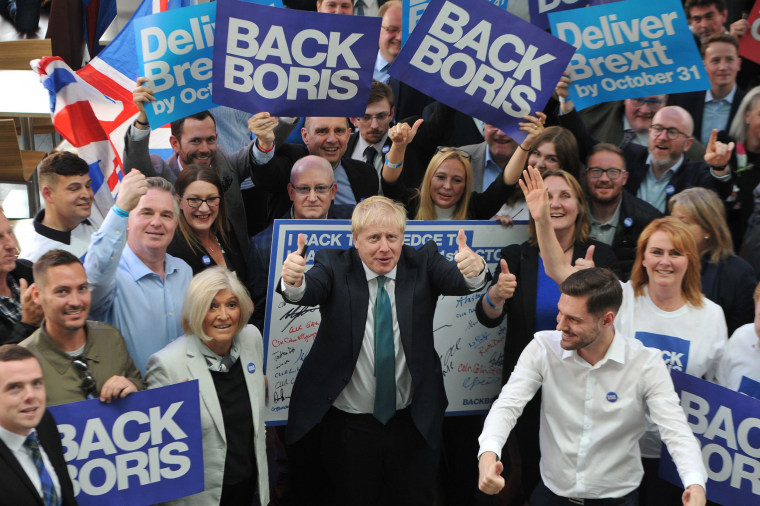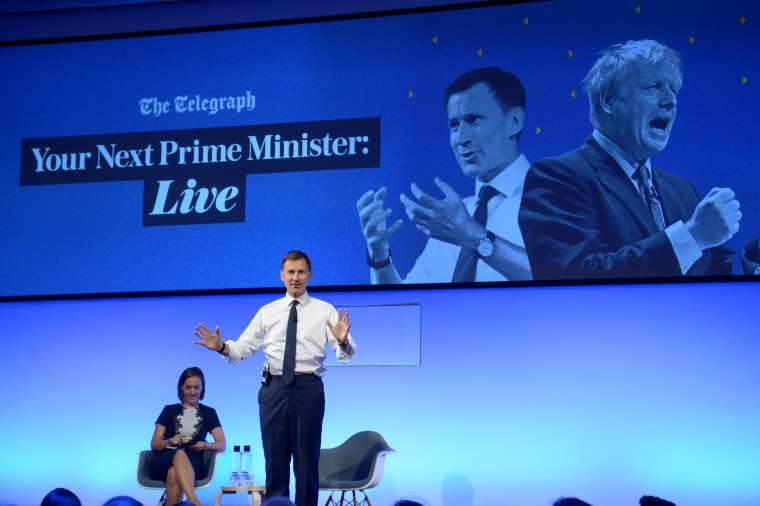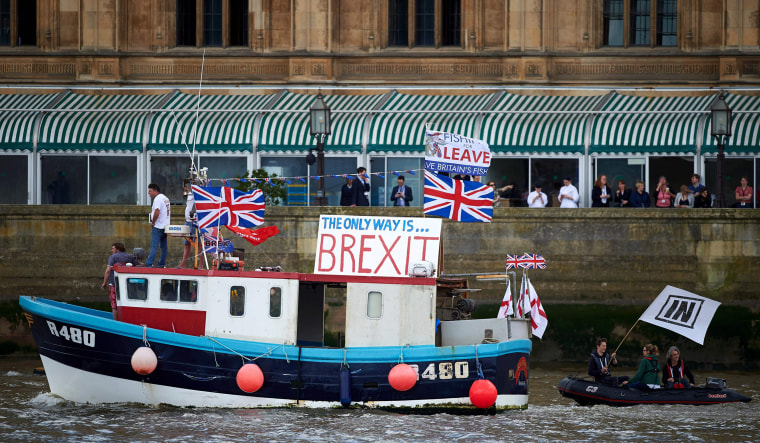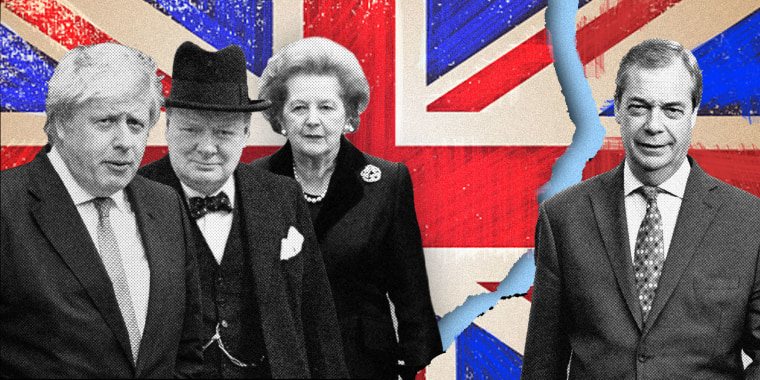LONDON — Britain’s 2016 referendum campaign to leave the European Union was built on positive statements about “taking back control” and giving the billions the United Kingdom spends on the 28-nation bloc to the National Health Service.
Trade deals with foreign partners would blossom, boosting the national finances and cutting bureaucratic red tape would unleash entrepreneurialism, pro-Brexit campaigners promised.
Today, the Brexit movement has become almost entirely based not on material gains but on a democratic principle — that the referendum result must be enacted no matter what. The ruling Conservative Party looks set to become the most high-profile victim of this transformation.
After almost 10 years in power and 185 years in existence, its voters and members are leaving in droves to support the upstart Brexit Party. A fractious leadership battle has been defined by who can talk the toughest on Europe — a union Britain has been part of for half a century.
Whether the party of Prime Ministers Winston Churchill and Margaret Thatcher, which can trace its roots back to the English Civil War, can survive the onslaught is unclear.
By Tuesday, the Conservative Party will have a new leader — who will also be the country’s new prime minister — to replace Theresa May.
Clear front-runner Boris Johnson has staked his reputation on leaving the E.U. "do-or-die" on the next deadline of Oct. 31.
Chancellor Philip Hammond — who backed remain in the 2016 vote — on Sunday became the most senior figure to declare he would resign from the government if Johnson wins, such is the finance minister's opposition to Johnson's hardline Brexit approach.

This illustrates what Johnson himself has highlighted as the biggest threat to the party: voters and members leaving to support both Nigel Farage's Brexit Party on the right and the anti-Brexit Liberal Democrats on the left.
As leader of the U.K. Independence Party, career Euroskeptic Farage played a key role in pressuring then-Prime Minister David Cameron into holding a referendum and then in persuading the British public to narrowly back leaving the E.U.
The Conservative Party — also known as the Tories, thanks to its descent from an English political faction from the 17th century— won 43.5 percent of the national vote in a 2017 national election. This was just enough to put together a minority government with the help of the Democratic Unionist Party, a Northern Irish party which has 10 elected members of Parliament in Westminster.
Just two years later, an opinion poll gave the party only 24 percent of the vote share in a future general election — one point ahead of the Brexit Party.
Disaffected former Tory voters NBC News spoke to favored a so-called “no-deal” option, which would see the U.K. leave overnight on Oct. 31 without any tailor-made agreements governing trade, customs, immigration and a long list of other things.
Industry figures, banking leaders, analysts, trade unions and politicians have warned of the dire consequences of such a move, with the U.K. Treasury’s own analysis estimating that a “no-deal” Brexit would see the GDP plunge by 7.5 percent.
Despite these warnings, a full 76 percent of party members believe Britain should leave the E.U. whether or not there is a deal, according to a recent study. Only 35 percent of the entire electorate thinks the same.
And now Conservative members of all stripes are deserting the party over May’s inability to meet her own Brexit deadlines.
Ian Summerell, a gunmaker from Yeovil in North Somerset, is a lifelong Tory voter who now vows to join the Brexit Party if Foreign Secretary Jeremy Hunt wins the Tory leadership instead of Johnson.
Hunt is seen by some as a safe pair of hands compared to the more boisterous and unpredictable Johnson — but Brexit-supporting voters will not let Hunt forget that he voted “remain.”
Crucially, Hunt has not promised to leave Oct. 31, preferring to wait and negotiate a settlement with the E.U. over a ”no-deal” exit.
Summerell, 62, says he would never support the Conservatives again if Hunt were to win the leadership race.
“He’s a ‘remainer,’ he’s a ‘remainer’ candidate, he’s Theresa May in trousers,” Summerell says.
“Brexit is foremost on everyone’s minds,” he adds. “The traditional Tory party would have been for the rule of law and the basic rights of every Englishman. Winston Churchill and all the rest of it.”
Summerell explains the appeal of the Brexit Party by praising a speech in early July by Anne Widdecombe, a former Tory minister who disappeared from politics and has since reinvented herself as a tub-thumping pro-Brexit nationalist. She was elected to the European Parliament in last month’s election, along with 28 other Brexit Party candidates.
“There is a pattern that is present throughout history of oppressed people turning against their oppressors,” she told fellow legislators in her maiden address in Strasbourg. “Slaves against their owners.”
The speech went down well with many Conservatives, including Summerell.
“We don’t have politicians that hit the nail on the head anymore,” he says.

Didier Delmar is a dual French-British citizen who joined the Conservatives during a stint here as a student in the 1980s. Now an entrepreneur, he runs a search engine-marketing business. His lively Twitter account — on which he posted an image of his shredded membership card — shows a picture of Thatcher, a Conservative Party icon who was prime minister from 1979 to 1990.
But Delmar, 54, has enthusiastically signed up to the Brexit Party which he says is “more Thatcherite than May will ever be in her life.”
After Brexit, it is likely that the automatic right of U.K. citizens to travel and live across the E.U. will be lost, with the same happening to Europeans coming to the U.K.
Delmar says this doesn’t bother him.
“That’s not the issue. The issue is to respect the vote,” he says, referring to the Brexit referendum. “I’m a French immigrant. I came here and was more than welcomed and [Britain] made my life possible. But the main thing is to respect the vote whatever the outcome is.”
“If the vote was to bring the death penalty back, you might not like it but you’d have to respect it,” he added.
Successive Conservative leaders — including Thatcher — made the case for E.U. membership on the grounds of economic strength and security collaboration, although at various points they were skeptical of the bloc’s commitment to a closer political union. In Britain right now, this feels like a long time ago.
The impact of the hardening pro-Brexit stance among the party’s 160,000 members has repercussions for the entire country of more than 66 million.
“We have a Conservative Party that has become almost completely consumed by Brexit now, to the point that it’s almost blocking out the sun and sucking the oxygen out of any other issues,” Tim Bale, professor of politics at Queen Mary University in London, said.
“That then poses the question of what happens if we don’t get Brexit and whether the party can hold itself together,” he said.
Bale is part of a team that’s recently finished an in-depth study of the top six political parties in the U.K., the results of which will be published later this year. The initial findings, related to the Conservative Party, show Brexit towering over all other issues.
“It’s transcended party politics and it’s begun to consume one of the parties,” he says, referring to the Tories.
Another disgruntled former Tory voter interviewed for this story asked for his full name name to be withheld, fearing his views would cause problems with those around him. The voter, who lives in a strong anti-Brexit area, espouses his strongly held views on a Twitter account.
It’s another example of just how controversial and divisive Brexit has become.

If Westminster is being shaken up, no other member of Parliament has been quite so shaken as Matt Warman, who represents the Boston and Skegness constituency in England’s east midlands.
More than three quarters of voters here — 75.6 percent — chose to leave in 2016, the highest rate in the country. This part of England was a popular destination for migrants from countries such as Poland and the Czech Republic. The 2011 census showed that Boston’s population had grown by 15.9 percent since 2001 — twice the national rate.
According to detailed polling of the reasons behind the 2016 result, immigration was the second most important issue for “leave” voters, after ensuring all important decisions about the U.K. are made here and not by E.U. institutions.
And in the European Parliament elections in May, 56.1 percent of voters in the town of Boston voted for the Brexit Party compared to 13.1 percent for the Conservatives.
“A very high number of people in my constituency voted Brexit Party and they are doing that because they are enormously frustrated with what the government has failed to do,” Warman says. “We need to take that on board.”
“If we don’t deliver, we are going to see far fewer people voting and we’ve already got a significant turnout problem in this country overall.”
While Warman, a former journalist, voted to remain in the E.U. in 2016, he is adamant that the U.K. now must leave in October at all costs.
That includes leaving with “no-deal,” he says.
“In my judgment, the government is quite well-equipped to mitigate economic problems, but we do not have many tools in the box when it comes to mitigating fundamental distrust in democracy,” he says.
What is at stake is nothing less than the integrity of Britain’s democracy, Warman believes. With so many people in his constituency voting Brexit, they are now enormously frustrated that the government has failed to deliver and this must be taken on board, he says.
Warman adds: “Our priority has to be leaving — possibly without a deal — in order to do everything we can to maintain what limited amount of trust there is in democracy that we have left, and try to rebuild it in the future.”




